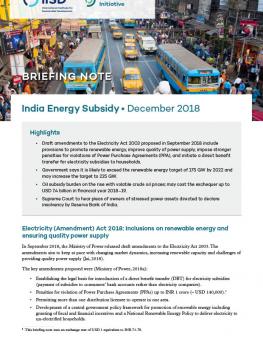
India Energy Subsidy Briefing December 2018
The latest news on energy subsidy issues in India, including draft amendments to the Electricity Act 2003, India poised to exceed renewable energy target and oil subsidy burden potentially on the rise.
As part of its work on energy policy and sustainable development in India, the Global Subsidies Initiative publishes a regular briefing on issues related to energy subsidies.
Below are highlights from the December 2018 edition:
- Draft amendments to the Electricity Act 2003 proposed in September 2018 include provisions to promote renewable energy, improve quality of power supply, impose stronger penalties for violations of Power Purchase Agreements (PPA), and initiate a direct benefit transfer for electricity subsidies to households.
- Government says it is likely to exceed the renewable energy target of 175 GW by 2022 and may increase the target to 225 GW.
- Oil subsidy burden on the rise with volatile crude oil prices; may cost the exchequer up to USD 7.4 billion in financial year 2018–19.
- Supreme Court to hear pleas of owners of stressed power assets directed to declare insolvency by Reserve Bank of India.
For any additional or more detailed information, please do not hesitate to contact Christopher Beaton or Vibhuti Garg.
Participating experts
You might also be interested in
India Faces Clean Energy Challenges as Energy Demand Soars and Global Fossil Fuel Subsidies Rise
New research finds the global energy crisis and increasing energy demand have pushed India's energy subsidies to a 9-year high.
G20 energy ministers call for cooperation on nuclear energy & low-emission hydrogen
The Group of 20 energy ministers' meeting concluded in Goa on July 22, 2023, with the final summary failing to include language on the phase-down of unabated fossil fuels.
Implementing Solar Irrigation Sustainably
This guidebook provides recommendations to state policy-makers on how they can implement solar irrigation models, particularly decentralized solar plants for irrigation under the PM-KUSUM scheme, effectively and sustainably.
COP 29 Outcome Moves Needle on Finance
In the last hours of negotiations, concerted pressure from the most vulnerable developing countries resulted in an improved outcome on the finance target, with a decision to set a goal of at least USD 300 billion per year by 2035 for developing countries to advance their climate action.